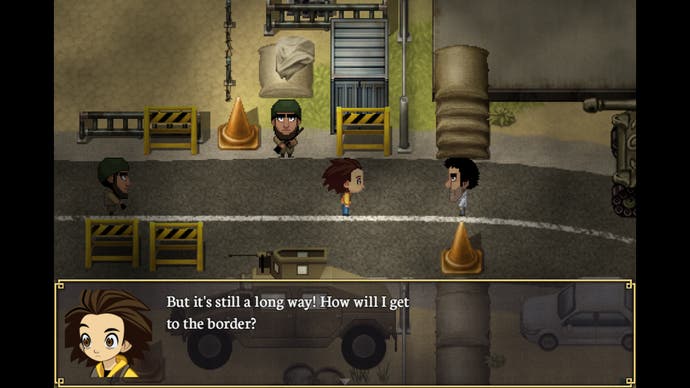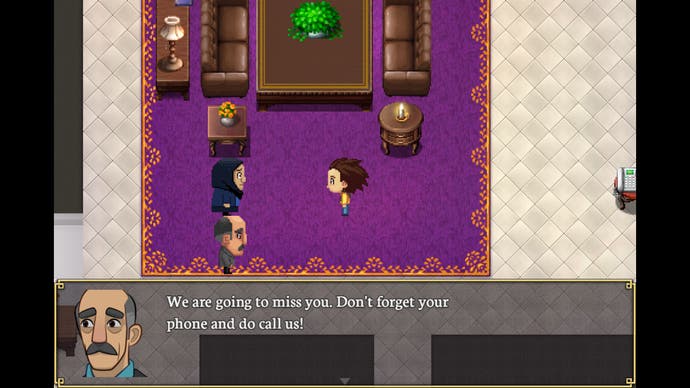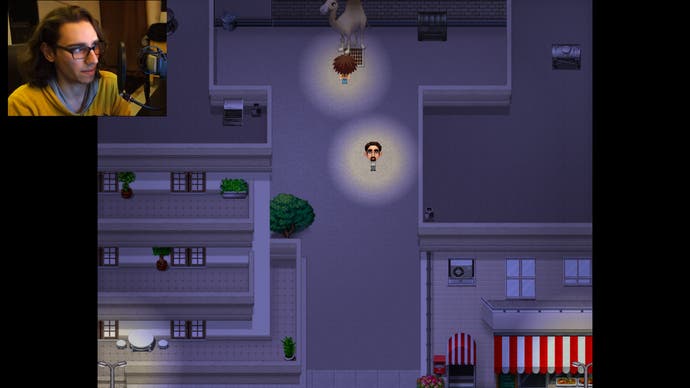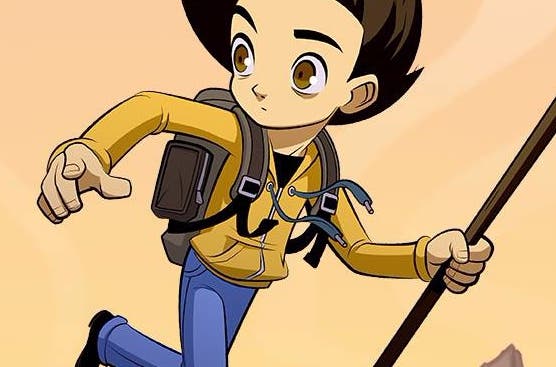How a Syrian refugee's story became a JRPG
"Humour is always part of disaster."
It could be any other throwback 16-bit adventure. I'm standing near low trees on the far side of a corrugated iron shack, waiting for a guard to turn around so I can break for the road at the top of the screen. The furnishings are the stuff of Final Fantasy 4, albeit passed through the guts of Fallout - chubby oil drums, wide-eyed chibi sprites, some nicely chiselled ruins. Only the black Islamic State flag draped across one wall gives it away. Created with the aid of German developer Causa Creations, Path Out is based on designer Abdullah Karam's experiences as a refugee, fleeing the war in Syria - a real-life survival story dressed up as an episodic Japanese role-playing game.

It's a tale that, in Karam's words, aims for "a sense of both immersion and alienation", wooing the nostalgic player with its retro ambience only to rip the carpet from beneath you. It's also, somehow, a game with a hearty sense of humour - one that turns the camera's gaze back mischievously toward the player's preconceptions rather than striving to objectify its subject's predicament. Karam has recorded a number of YouTuber-style reaction videos that trigger at certain points in the story: die while navigating a minefield and he'll pop up in one corner to troll you, gleeful at his own demise.
The Syrian civil war is now in its seventh year, with no end in sight. Sparked by the massacre of anti-government protestors in March 2011, it has led to the deaths of almost half a million people, with a further million people injured. Approximately 12 million others - half the country's peacetime population - have been forced from their homes, many fleeing the Middle East altogether in hopes of a new life in western Europe. There have been hundreds of casualties along the way. Some Syrians have perished while crossing the Mediterranean in crowded, barely sea-worthy vessels. Others have succumbed to hypothermia while traversing the open country in winter. Those that make it to central Europe often face indifference at best, open hostility at worst, as far-right groups and reactionary media outlets mobilise against what they style an "invasion". Karam's hope is that Path Out will help counter such bigotry and inspire players in other countries to petition their elected representatives for some kind of long-term resolution.
"Being Syrian in the last seven years has been an unbearable burden," he says, speaking to me by email. "People acknowledge the war, but we felt pretty much left alone for a long time, with so many nations closing their borders. 'What have we done to this world?' was always a question that came up. I feel like people don't know enough about us, who we are, why we had to leave Syria, and that's why I decided to to make something where I can speak for my people and let everyone knows how it feels to be Syrian."

A child of Hama, one of Syria's largest cities, Karam made the painful decision to leave in 2014 to avoid being drummed into President Assad's army. "I'm really just an average kid that spent most of his life going to school, listening to music, drawing and playing video games," he goes on. "I never was a political person, except for the moments when the government would turn off the power and therefore also my Xbox. Everything changed with the war. When I was 18, it became clear that they would draft me very soon. That meant killing or being killed. There was no way that I could join this senseless civil war - it would have meant possibly shooting at relatives from Aleppo." Bidding his neighbourhood goodbye, Karam travelled north with a group of friends and relatives, creeping through minefields and past military checkpoints. He was eventually smuggled over the border to Turkey in an oil barrel, used by smugglers for illegal fuel trade before the war.
Karam's brother, portrayed in the game as a left-wing political activist, had already departed for Turkey to avoid the Assad regime's attention. Together, the pair laboured to scrape together the funds to move further into Europe. "We stayed there for six months in a relatively quiet place, but it was very hard. Working 15 hours a day, bad wages, no insurance, all illegal. We took all the money we made and our savings to move to Europe. To move to a place where we would be respected as human beings, and where we could work and just live a normal life. We were lucky. We made it."
While employed off the books in Turkey, Karam was occasionally able to indulge his creative side, designing artworks for local businesses. He later became an enthusiastic member of the DeviantArt community under the handle "De Oh Vi". Having made it to the relative security of Austria, Karam felt the urge to tell his story in some fashion, but it wasn't till a chance encounter with Causa's Georg Hobmeier in Salzburg that the concept of a video game memoir arose.

Hobmeier had founded Causa with programmer Tilmann Hars in May 2014 to develop games that offer social commentary (the studio's other projects include Burn the Boards, a stressful puzzler which casts players as an Indian worker dismantling old mobile phones in dreadful conditions). Gripped by Karam's account of his travels, he enlisted the graphic artist Brian Maine to serve as a mentor, and secured funding for the project from Vienna's University for Applied Arts in 2016. "For me this is really a dream coming true," says Karam. "I always dreamed of working in the games industry. Ironically enough, that would have been impossible in Syria."
Available now in demo form on Itch.io, Path Out's first episode is a straightforward but eye-opening work, despite a rough-and-ready English script. Beginning in Karam's old bedroom in the midst of a power outage, you explore a small neighbourhood, talking with relatives and carrying out a few fetch-quests before the journey itself begins. The broad events of the story are set in stone, but players are free to make their own small decisions along the way. Some of these are more practical, while others are a test of character: it's possible to steal incriminating documents from a neighbour in return for paperwork that will get you through the border checkpoints. The continual prospect of betrayal is one of Path Out's more harrowing aspects - lost in the bombed-out wilderness of Aleppo with little besides a pocketful of cash, you have no choice but to take the game's smugglers at their word. Soldiers are largely not to be trusted, regardless of faction: those I encountered were only too happy to run me down and rob me, if not kill me outright.
The game's art style is calculatedly self-contradictory, a mixture of fact and fantasy that blurs sprite designs reminiscent of classic JRPGs with Syrian or Arabian architectural traditions. "It wasn't a particular challenge for Brian, the moment we decided upon a particular style," Karam comments. "We did actually quite a bit of experimentation, also with Arabian calligraphy, but in the end everything was basically determined by the story and its components." Rather than simply playing his heritage straight in the game, Karam often takes the opportunity to scoff at western European assumptions about Syrian society, jocularly pointing out racist cliches like the presence of a camel in one street scene.
"There is a lot of fear and paranoia going around [in Europe], portraying us as a vile, orthodox-religious and uncivilised bunch that just can't decide which terrorist outlet to join," he says in conclusion. "In reality, Syria is much closer to the west. Yes, it was never a real democracy, but our daily lives don't differ much from the average westerner. Yes, we might follow different religions, but in the end, we are faced with the same urgent existential questions: PC or console?"


